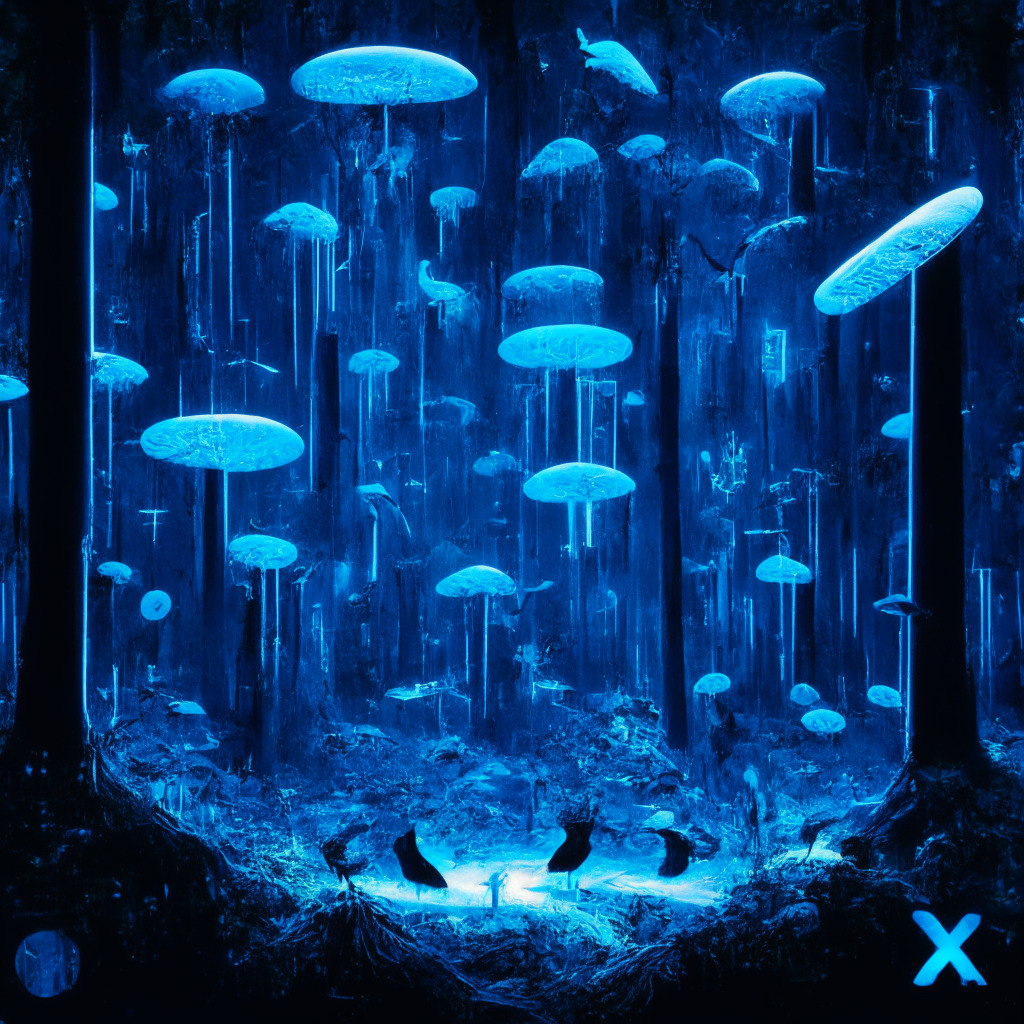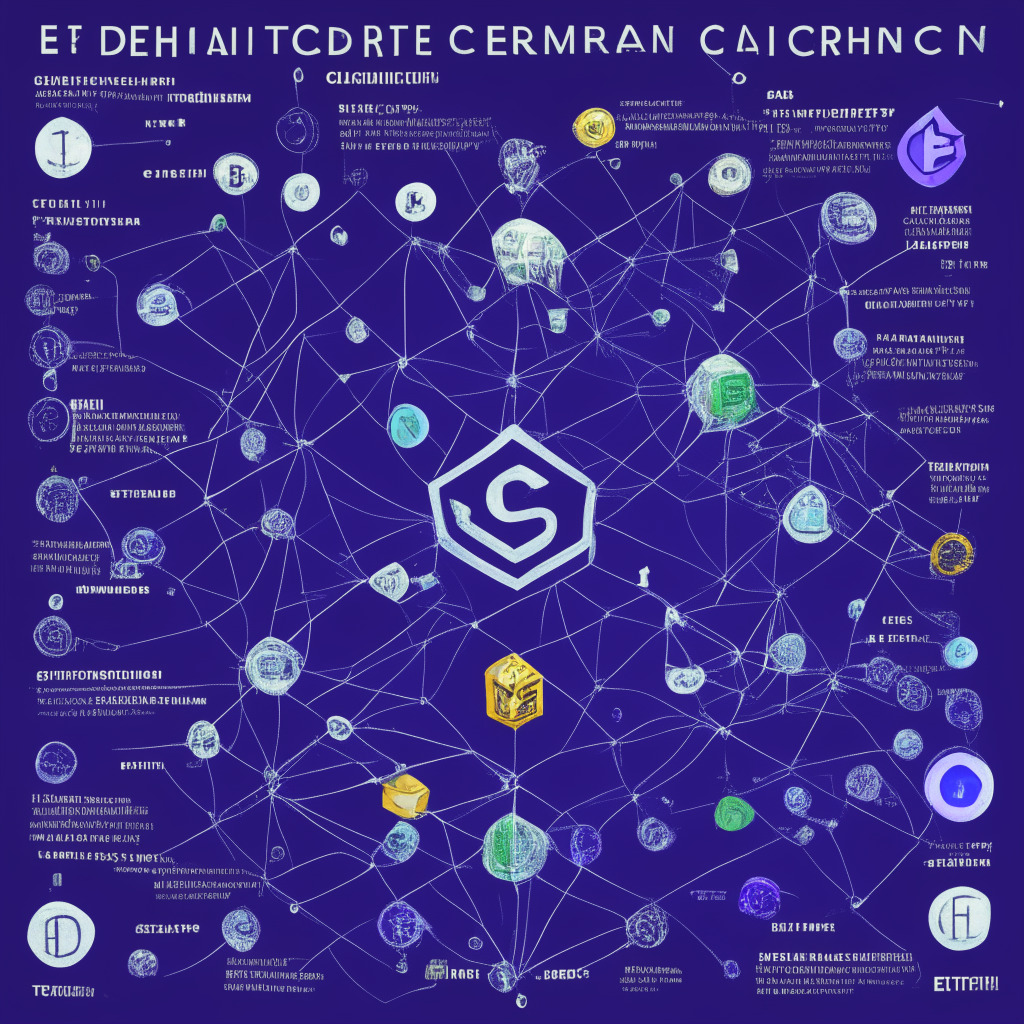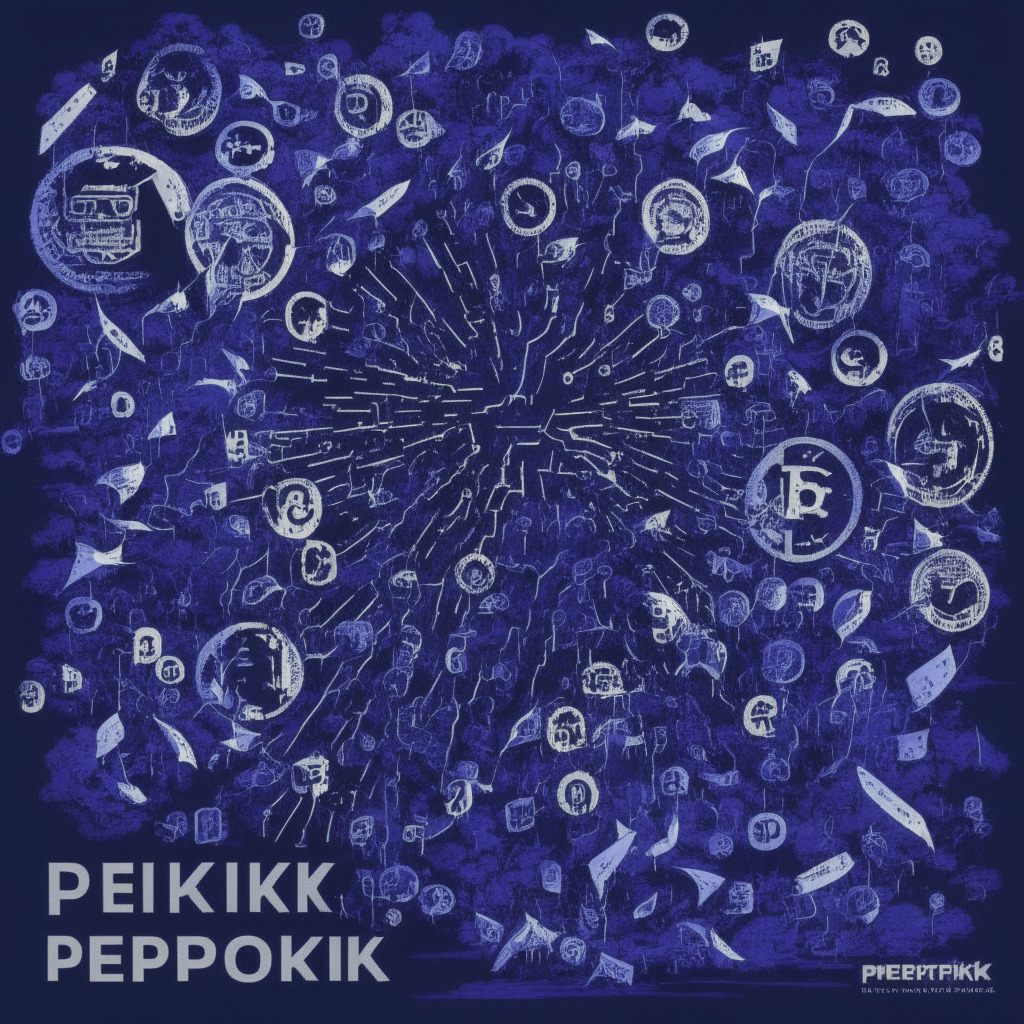StarkWare, the force behind Starknet blockchain, plans to restore accessibility of digital currency for users, following outcry over wallets turning empty after a major tech upgrade. Those who didn’t timely upgrade their Argent or Braavos wallets experienced the issue. Starkware underlined paradoxes of tech advancements in the crypto sphere, balancing benefits against potential user frustrations.
Search Results for: Render Network
Decentralization Versus Sanctioned Russian Banks: The P2P Dilemma in Crypto Exchanges
Crypto exchanges including OKX and Bybit have delisted Russian banks Tinkoff and Sberbank, due to Western sanctions following the Ukraine invasion. Despite this, the decentralized nature of P2P transactions makes complete enforcement challenging. The delistings highlight the growing reliance on cryptocurrencies amid Russia’s economic instability due to these sanctions.
Shibarium’s Second Attempt: A Tale of Resilience Amidst Crypto Turbulence
The Shibarium network, part of Shiba Inu project is planning a public relaunch after addressing initial launch issues. The Ethereum-based platform hopes its improvements will handle high traffic volumes better, and increase Shiba Inu’s blockchain prominence, with a focus on metaverse, gaming and cost-efficient solutions for DeFi projects.
Unleashing the Crypto Future: An Analysis of the FIT Act and its Impact on the Digital Asset Space
“The FIT Act marks the premiere of crypto-focused legislative efforts gaining traction in U.S. Congress. This signals mutual agreement about the significance of the digital assets sector, addressing the inadequacy of the current regulatory system, and fostering innovation. Policymakers are establishing a suitable framework for the rapidly evolving crypto industry.”
Coinbase’s Steadfast Endeavor: Future of Crypto Adoption Amid Regulatory Challenges
Coinbase, amidst falling trading volumes and revenue, is focusing on the future of crypto by launching a new blockchain. Key adoption aspects under discussion include blockchain scalability, non-financial crypto use utility, and navigating crypto regulation. The company advocates social solutions to resolve tech-related issues and is leading efforts to influence crypto-specific U.S. legislation through its nonprofit, Stand With Crypto.
Skeptical Voices: Rapper Post Malone and US CBDCs Debate Stir Crypto Community
American Rapper Post Malone expressed skepticism about the potential Central Bank Digital Currency, associating it with increased government control. The duo highlighted risks including growing state control, potential loss of citizen’s income and potential impacts on social credit scores and behavioral control. Such concerns have sparked discussions in the crypto community.
Navigating the Rocking Boat: RNDR’s Strained Journey vs. XRP20’s Rising Popularity
After a massive price retracement, RNDR, the leading Web3 GPU project, shows signs of life at the $1.50 lower trendline. However, the future remains uncertain due to the dreaded ‘death cross’ in its graph. Meanwhile, XRP20, staking promising returns, has been gaining traction among prudent investors, strongly benefiting from its position on the Ethereum network. Its significantly lower price than XRP and a 0.1% burn mechanism make it an attractive option in the crypto market.
BNB Chain’s Pioneering Security Updates: Exploring the Potential Impact of Plato and Hertz Upgrades
“BNB Chain is set for an upgrade to boost security infrastructure and ensure compatibility with other EVM blockchain networks. Known as the Plato upgrade, it introduces BEP-126 to implement a rapid finality mechanism to prevent block reverts and chain reorganization for better trust and system efficiency. Another upgrade, the Hertz hard fork, is aimed at keeping BNB Chain updated with the latest Ethereum developments.”
Exploring the Impacts of PayPal’s Stablecoin PYUSD: Vehicle for Financial Inclusion or Corporate Gain?
“PayPal’s U.S. stablecoin, PYUSD, has sparked interest in the crypto world. Unlike smaller cryptofirms, traditional giants like PayPal can influence regulators to accommodate their aspirations. However, whether PYUSD will democratize access or predominantly serve business interests remains uncertain.”
Enhancing Blockchain Integrity Through Auditing: Imperative or Insufficient?
“Blockchain auditing inspects and authenticates data and transactions within a network for accuracy and legitimacy. Regular audit sessions can identify vulnerabilities in codes and unauthorized activities, bolstering accountability and confidence in blockchain systems. Comprehensive security also requires thorough Know Your Customer procedures, highlighting the need for multifaceted strategy.”
Cryptocurrency Trading: A Goldmine or a Field of Manipulation and Deception?
“Incryptocurrency trading, ‘inauthentic chatter’ on Twitter has been known to derail market trends of specific tokens, leading to potential manipulation. This situation often mirrors the ‘pump-and-dump’ schemes, with token prices surging significantly following suspicious social media activity. The case raises questions about effective crypto regulation.”
Navigating the Bitcoin Halving: A Crossroads for Miners Between Efficiency and Survival
“The expected Bitcoin halving event in April 2024 could cause a 30% drop in Bitcoin’s computational force, potentially making mining unprofitable for many. Miners could mitigate this by deploying new-generation machines that require less power, thus reducing operating costs.”
DeFi Protocol EraLend Robbed of $3.4M: A Wake-up Call for Blockchain Security
“EraLend, a Decentralized Finance (DeFi) Protocol, has lost $3.4 million in a ‘re-entrancy attack’. This incident underscores the need for advanced security protocols within blockchain transactions, highlighting how dependencies and vulnerabilities can be exploited.”
Gag Order in Crypto Case: Balancing Fair Trial and Blockchain Transparency
“Concerns arise as a U.S. federal judge suggests a gag order in the case of a former cryptocurrency CEO, Sam Bankman-Fried (SBF), potentially impacting transparency within the blockchain industry. This order might set a precedent of censorship, affecting public perception and understanding of the blockchain and crypto ecosystem.”
Elon Musk’s X Tokens Revolution: Deciphering the DEX Flood & The Crypto Paradox
“Musk’s rebranding of Twitter to ‘X’, coupled with a merger forming X.AI Corp., resulted in a flood of ‘X’ tokens across blockchain networks. Amid ambiguity, several tokens exhibited significant growth, highlighting the unpredictability of crypto trading and influential figures like Musk.”
FCA’s Sandbox: An Innovation Playground or a Risky Experiment for Blockchain Technology?
The U.K. Financial Conduct Authority is offering firms access to a digital sandbox for testing their products’ early-stage performance. The sandbox provides datasets, APIs, and data security protection. This initiative helps firms evaluate products, supports various digital-asset use cases and fosters an ecosystem of integration within the digital economy. The sandbox’s broader availability piques crypto enthusiasts’ interest, prompting discussions around blockchain technology’s future.
EU’s New Data Act: Justifiable Concern for Blockchain Sphere or Unfounded Fear?
The EU’s new Data Act draft has stirred up concerns in the blockchain sector, as it appears to ignore industry-specific issues and could potentially deem most smart contracts invalid. The legislation emphasizes on the “vendors” of these automated programs, causing fear among lobbyists as it could imply endless accountability in decentralized frameworks with no single seller.
Navigating the Bitcoin Ordinals Boom: The Rise of BRC-69 and the Challenges Ahead
“The Bitcoin Ordinals, a method of creating Bitcoin NFTs, has increased significantly with the release of the BRC-69 token standard. Promising a 90% reduction in inscription costs, it simplifies the process down to just a single line of text. Despite recent volatility, this development continues to attract investor interest.”
Cybersecurity in the Crypto World: Unraveling the Challenges and Implementing Countermeasures
“In an ever-evolving crypto world, cybersecurity is a priority. The Bank For International Settlements (BIS) has proposed a seven-point plan intended to fortify digital assets, mainly central bank digital currencies (CBDCs), against cyber threats due to their complex systems, large attack surfaces, and numerous potential points of failure.”
BRC-721E: Bridging Ethereum NFTs to Bitcoin’s Ordinals – Future Potential and Challenges
The new BRC-721E token standard facilitates the migration of Ethereum-based NFTs onto Bitcoin, transforming ERC-721 NFTs into Ordinals. This allows users to transfer digital collectibles from Ethereum to Bitcoin using a bridging contract while preserving essential metadata and provenance.
Ethereum’s Shanghai Upgrade: Boon for Crypto Forensics or Hindrance in Detecting Illicit Activities?
Ethereum’s Shanghai upgrade transition to proof-of-stake blockchain has opened new investment themes like DeFi, stablecoins, and NFTs. Ethereum’s staking yields now represent the “risk-free rate” of crypto, enabling easier detection of suspicious activities like money laundering and wash trading. However, price volatility may hinder effectiveness in identifying illicit activities.
BNB Chain Luban Hard Fork: Enhanced Security, Performance, and Prospects for BNB Token
The upcoming BNB Chain Luban hard fork aims to enhance network speed and security, through three Binance Smart Chain Evolution Proposals: BEP-126 (Fast Finality), BEP-174 (Cross Chain Relayer Management), and BEP-221 (CometBFT Light Block Validation). These improvements could benefit users and potentially boost BNB token value.
Swaprum Scandal: Balancing Trust, Transparency, and Decentralization in Crypto
The recent Swaprum exit scam on Ethereum Layer 2 network Arbitrum reveals the ongoing security challenges in the crypto world. This incident highlights the importance of credible security audits, regulatory framework, and user education in addressing growing concerns about hacks, scams, and the future of cryptocurrencies.
U.S. Crypto Regulation: Balancing Innovation and Public Safety to Ensure Global Leadership
The U.S. Chamber of Digital Commerce is urging Congress to prioritize a national approach to crypto regulation, warning that the lack of proper legal frameworks may result in the nation falling behind in the rapidly evolving blockchain space. Implementation of a unified strategy could bolster U.S. leadership, promote innovation, and address potential risks.
Matrixport & Copper Partnership: Exploring Prime Brokerage Benefits and Potential Risks
Matrixport collaborates with crypto custodian Copper, integrating with Copper’s ClearLoop for off-exchange settlements for institutional clients. This partnership aims to create a more secure, transparent, and accessible financial market infrastructure for the digital asset industry, promoting capital efficiency and reducing counterparty risks. However, skeptics raise concerns on new risks and increased systemic risk from the integration.
Bitcoin’s $900M Weekly Options Expiry: Bull vs Bear Battle and the Path to $30,000 Breakout
The upcoming $900 million Bitcoin weekly options expiry on May 12 could be pivotal in determining Bitcoin’s price movement. Bearish traders may capitalize on macroeconomic headwinds, Silk Road Coins’ FUD, and a transaction fee spike, possibly affecting the crypto market and testing support levels.
Rising Blockchain Competitors Threaten Solana’s Dominance: Can It Stay Ahead?
Six new blockchain networks are set to launch soon, intensifying competition in the blockchain ecosystem. Despite the highly competitive landscape, Solana Labs founder Anatoly Yakovenko remains confident in Solana’s technical strengths, such as speed, higher transaction numbers, and more nodes. However, the influx of capital into new projects could cut into Solana’s market share, necessitating adaptation and innovation.


























